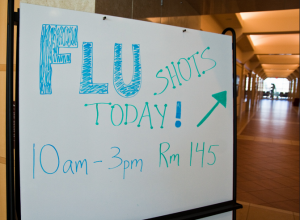The flu is considered benign compared to other life threatening diseases. Many of us choose to endure the suffering, pop some pills, and wait for a few days to get rid of it. But did you know that this seemingly common disease claims hundreds of lives and several thousand out-patient visits and hospitalizations per year? Worse, flu takes a toll on productivity, which makes it all the more important for companies to ensure employees get vaccinated on time.

Employers can organize provision of flu shots in office. From Steven Depolo
Influenza, or flu, is a contagious respiratory illness caused by flu viruses and can affect even the healthiest of people. It is different from a cold and can cause mild to severe illness and, at times, can lead to death. Most recover in a few days but some people suffering from chronic ailments may develop complications. Flu can also lead to bronchitis, sinusitis, ear infections, and pneumonia. Seasonal flu can also turn pandemic, as was the case in 2009.
Flu has a high annual impact on productivity. Approximately 111 million workdays are lost in each flu season, which amounts to around $7 billion per year in sick days and lost productivity.
The Centers for Disease Control and Prevention (CDC) recommends the single most effective way to deal with the influenza virus – vaccination. Washing your hands frequently does help, but according to experts, it is not the best way to avoid spreading the influenza virus. In 2012, vaccination prevented nearly 80,000 people from being hospitalized and 6.6 million people from contracting the virus.
One reason why people are wary of a flu shot is because they believe in a long-standing myth that vaccination can make them sick. An estimated 45 percent of the respondents in a survey think they can get the flu from the vaccine. “It’s amazing how the very simple message that flu shots are beneficial seems to have gotten lost,” says Dr. Amy Crawford-Faucher, an assistant clinical professor in the department of family medicine at the University of Pittsburgh Medical Center.
Having a contingency plan in place to deal with each flu season is essential. Awareness campaigns for employees, onsite clinics, and free flu shots in offices can go a long way in ensuring better vaccination rates. Senior leaders in the topmost management can set the standards by getting vaccinated themselves well ahead of time. Businesses can team up with CDC and local health departments to understand better flu prevention techniques, and encouraging infected employees to apply for leaves can prevent the spread of virus.